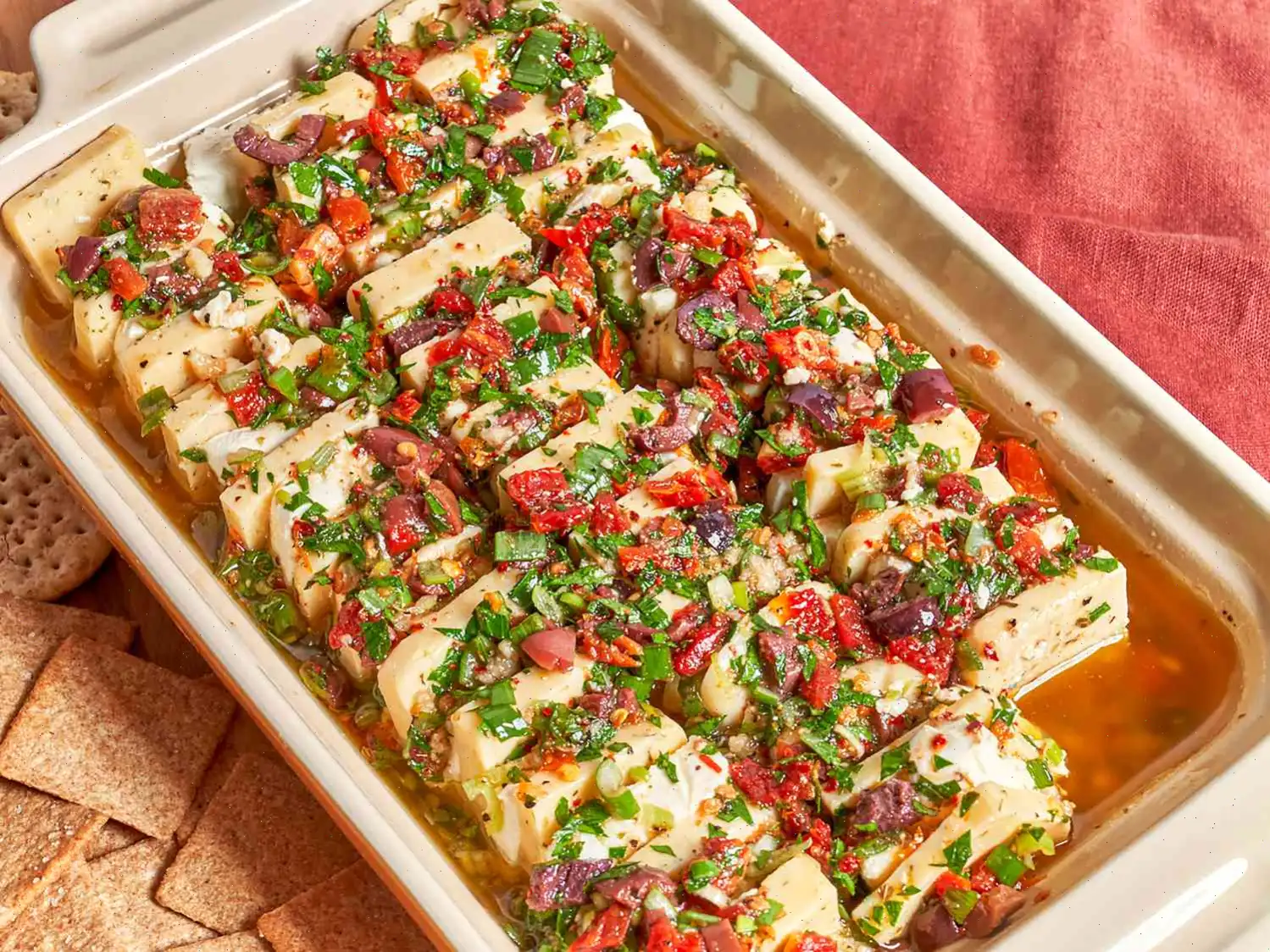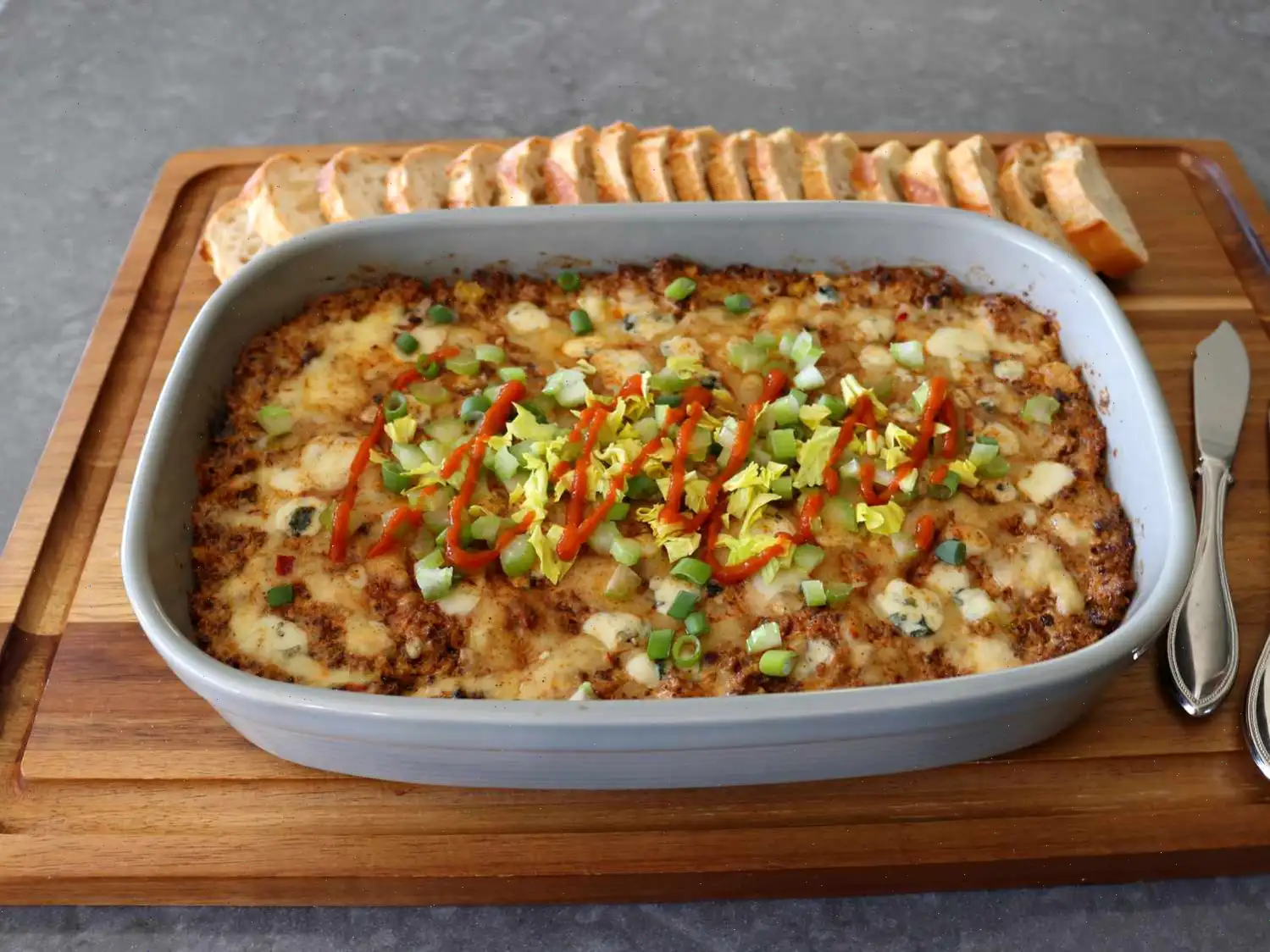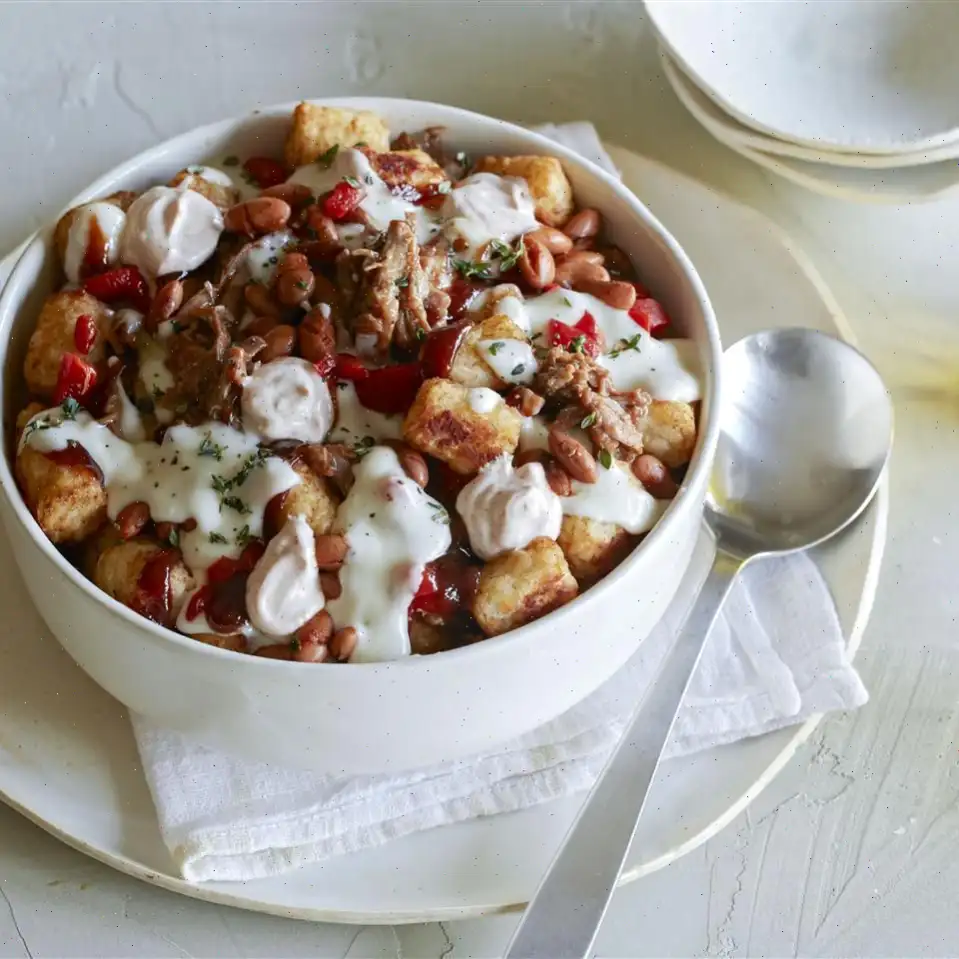
Mediterranean Marinated Cheese Recipe
Ingredients
- 1 (8 ounce) block dill havarti cheese
- 1 (8 ounce) block cream cheese, cold
- 1/2 cup extra-virgin olive oil
- 1/4 cup red wine vinegar
- 1/4 cup white wine vinegar
- 1/4 cup finely chopped marinated, drained sundried tomatoes
- 3 tablespoons finely chopped Italian parsley
- 3 tablespoons finely chopped green onion
- 2 tablespoons finely chopped olives
- 1 clove garlic, finely minced
- 1 teaspoon white sugar
- 1/4 teaspoon dried oregano
- 1 1/4 teaspoons lemon pepper
- 1/2 teaspoon kosher salt
- 1/4 teaspoon crushed red pepper, or more to taste
Directions
Step 1: Place the havarti and cream cheese blocks in the freezer for 15 minutes while you prepare the marinade.
Step 2: In a bowl, whisk together the olive oil, red wine vinegar, white wine vinegar, sundried tomatoes, parsley, green onion, olives, garlic, sugar, oregano, lemon pepper, salt, and crushed red pepper until everything is well combined. Set the marinade aside.
Step 3: Slice the havarti block in half lengthwise, then cut each half into 1/4-inch slices to form squares. Repeat the process with the cream cheese block.
Step 4: Arrange the cheese squares in a shallow baking dish, alternating the pieces with slices standing on their edges and sandwiched together. Depending on the size of your dish, you can create 2 to 4 rows.
Step 5: Pour the prepared marinade over the cheese, ensuring it's well coated. Cover the dish and refrigerate for at least 4 hours, or preferably overnight, for the flavors to meld.
Step 6: To serve, transfer the cheese slices to a serving platter, keeping the alternating pattern intact. Spoon some of the marinade over the top to enhance the flavor. Serve with crackers for an added crunch.
Nutrition Facts (per serving)
- Calories: 169
- Total Fat: 16g (21% Daily Value)
- Saturated Fat: 6g (32% Daily Value)
- Cholesterol: 28mg (9% Daily Value)
- Sodium: 243mg (11% Daily Value)
- Total Carbohydrates: 2g (1% Daily Value)
- Dietary Fiber: 0g (1% Daily Value)
- Total Sugars: 1g
- Protein: 4g (9% Daily Value)
- Vitamin C: 2mg (2% Daily Value)
- Calcium: 115mg (9% Daily Value)
- Iron: 0mg (2% Daily Value)
- Potassium: 79mg (2% Daily Value)
* Percent Daily Values are based on a 2,000 calorie diet. Your daily values may be higher or lower depending on your calorie needs.
Origin Story
The Mediterranean Marinated Cheese is a popular dish inspired by the rich and diverse culinary traditions of the Mediterranean region. This dish, which combines cheeses such as Havarti and cream cheese with a flavorful marinade of olive oil, vinegar, and Mediterranean herbs, reflects the region's emphasis on fresh ingredients and vibrant flavors. The concept of marinating cheese is a well-loved tradition across Mediterranean countries like Greece, Italy, and Spain, where cheese often plays a central role in appetizers and meze platters.
While the exact origins of the marinated cheese recipe are unclear, it likely evolved as a way to preserve cheese while enhancing its flavor through the use of herbs, garlic, and olive oilingredients that have been staples in Mediterranean diets for centuries.
Regional Variations
The Mediterranean Marinated Cheese varies across the region, with each country adding its own twist to the dish. In Greece, for example, it is common to use feta cheese as the base, marinated in olive oil, garlic, and herbs like oregano and thyme. In Italy, marinated mozzarella or ricotta can be found, often paired with sundried tomatoes and fresh basil.
This dish has also made its way into modern fusion cooking, where chefs may experiment with different cheeses and marinades. The version presented here, which features a combination of Havarti and cream cheese, is a creative take that blends the smoothness of cream cheese with the tangy, mild flavor of Havarti, all soaked in a Mediterranean-style dressing.
How It Differs from Similar Dishes
While marinated cheeses are popular in Mediterranean cuisine, the Mediterranean Marinated Cheese recipe stands out due to its unique combination of two cheeses: Havarti and cream cheese. The use of Havarti, a soft and semi-soft cheese with a smooth texture, adds a subtle, slightly tangy flavor that contrasts beautifully with the creamy richness of the cold cream cheese.
Compared to other Mediterranean cheese dishes, such as Greek "Saganaki" or Italian "Marinated Mozzarella," this recipe focuses on a cold preparation, allowing the cheese to absorb the marinade's flavors over several hours or overnight. Saganaki, for instance, is typically served hot, where cheese is fried and served as an appetizer.
Where It's Typically Served
Mediterranean Marinated Cheese is commonly served as an appetizer or part of a meze platter, often accompanied by bread, crackers, or fresh vegetables. It is perfect for social gatherings, family meals, or parties, as it allows guests to enjoy a variety of flavors in a single dish. This marinated cheese is often seen at Mediterranean-themed dinners or gatherings, particularly in Greece, Italy, and Spain.
In these countries, it is typically enjoyed alongside a glass of wine or an aperitif, and it often accompanies other dishes like olives, grilled vegetables, and cured meats. In recent years, it has gained popularity in more globalized settings, making its way to fine dining restaurants and casual gatherings alike.
Fun Facts
- Havarti cheese, one of the key ingredients in this recipe, was first created in Denmark in the 19th century, and its name comes from the Havarti farm, where it was originally produced.
- Olives, an essential ingredient in this dish, have been cultivated for over 6,000 years and are central to Mediterranean cuisine, prized for their flavor and health benefits.
- The practice of marinating cheese dates back to ancient times, as a method of preserving cheese and adding extra flavors before refrigeration was available.
- While the Mediterranean Marinated Cheese is a modern twist, it closely resembles traditional "cheese salads" from the region, which often involve marinating cheeses in olive oil and vinegar with herbs and spices.
FAQ about Mediterranean Marinated Cheese Recipe
Comments
Charles Nguyen
10/06/2025 01:52:54 PM
This is insane, I can’t get enough.
che
01/02/2025 10:54:09 AM
I baked it at 400 until melted. It was delicious!
Karen Quealy
05/14/2025 05:57:06 PM
The first time I made it as directed, and it was good. Next time I replaced the cream cheese with fresh mozarella. We preferred it. Great recipe!
Sonia
08/21/2025 06:06:31 PM
Made it for Buco girls' night. They went crazy over this yummy dish.








